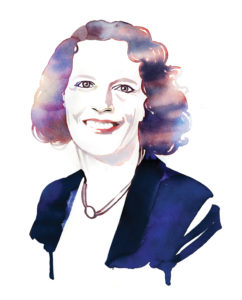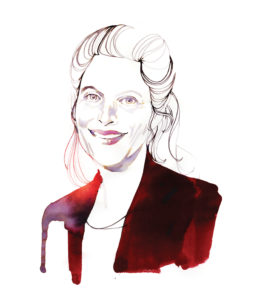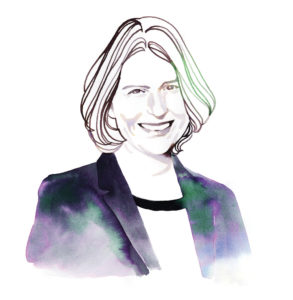Women Leaders in Academia
Good things come in threes. Indeed, the Latin phrase “omne trium perfectum” tells us that everything that comes in threes is perfect. That description certainly fits the three Stanford Law alums who are piloting three of the country’s top law schools: Gillian Lester, JSM ‘93, JSD ’98, dean of Columbia Law School; Kimberly Yuracko, JD ’98 (BA ’91, MA ‘94, PhD ’97), dean of Northwestern Pritzker School of Law; and Kerry Abrams, JD ’98, dean of Duke University School of Law. These alumnae are among a growing number of SLS graduates who have pursued an academic career track. And in a profession still dominated by men, they have risen to the highest leadership positions.
As the number of aspiring academics has increased at SLS, the law school has strengthened its efforts to prepare community members for careers in academia. In addition to the faculty’s long-standing role in mentoring student scholarship through organized courses and independent research, professors Barbara Fried and Alison Morantz co-chair a committee dedicated to guiding current students and assisting alumni and fellows who are entering the academic market.
“We try to support candidates throughout the entire hiring cycle, so they have someone in their corner whom they can turn to for guidance,” says Morantz. And these efforts have paid off. Last year, 86 percent of alums seeking an academic position were successful in securing tenure-track positions.
“The close-knit community and approachable faculty, combined with research opportunities here and across campus in a wide range of disciplines, offer our students and academic fellows a substantial support structure for entering the legal academy. And that so many of our alumni are finding success reinforces these efforts,” says Jenny Martinez, Richard E. Lang Professor of Law and Dean.
Here, we meet our women deans—and learn about their paths to academia.

Gillian Lester arrived at SLS in 1991 with an LLB from the University of Toronto and a mission—to get her JSD and become an academic.
“My area of focus was employment law, and I came into the program with a pre-approved dissertation proposal and a dissertation advisor who would become a wonderful mentor, [Professor] Deborah Rhode,” says Lester. What she accomplished in just two years is a testament both to her singular focus and to the environment that nurtured her ambitions.
“I wanted to become a scholar and a teacher, and I also needed to pay for my education,” Lester explains. So after a year in the JSD program, she became a teaching fellow in the LRW program and also a research assistant for, and eventually a co-author with, Professor Mark Kelman. The latter was “life-changing,” Lester says. “Earning a JSD gives you a glimpse of academia, but being in a research collaboration really made the difference.”
Also pivotal was the seminar for aspiring academics that she took with then-Dean Paul Brest and Professor Margaret Radin. “We met in Peggy’s living room and, by welcoming us into that intimate space, it felt like they welcomed us into the community of academics; they were investing in our success.”
In the seminar, Lester taught a class on the subject of her paper. “These were very translatable skills for academia, and at the end of the seminar I also had a paper that would kickstart future research.” Lester was hired as an entry-level professor at UCLA School of Law in 1994, eventually earning tenure. And in 1998, she defended her dissertation at SLS, “even though I had already gotten all the academic benefit without the formal conferral of a degree,” she says.
“In addition to building collegiality and bringing people together, I feel responsible for leveraging the law school’s role in creating a more just and well-governed society.”
—Gillian Lester, JSM ‘93, JSD ‘98 , Dean of Columbia Law School
From UCLA, Lester went to Berkeley Law in 2006, where she served first as vice dean and later acting dean when the dean took a leave of absence. “I had never aspired to be a dean, but that’s when I realized how much I liked the challenges and satisfaction of the position,” Lester says. “I always had enjoyed mentoring junior colleagues, reading other colleagues’ work, and helping them give voice to their ideas. Being a dean allows you to invest in the success of others in large and small ways and to help them flourish.” Lester became Columbia Law School’s dean in 2015 and says that she feels incredibly lucky.
“In addition to building collegiality and bringing people together, I feel responsible for leveraging the law school’s role in creating a more just and well-governed society. We are preparing the leaders of the next generation. They have vision, aspirations, and energy, but they don’t yet know how they’re going to fit in. We have three years to take that raw ambition and mold it.” And this brings Lester back to her law school experience: “To be well-trained and well-mentored at a critical time of my career was a gift that Stanford Law School gave me.”

Kimberly Yuracko, who graduated from Stanford with a BA with distinction in political science and honors in feminist studies, couldn’t decide whether to go to graduate school or to law school, so she did both.
Today, many students interested in academia pursue one of Stanford Law School’s joint degree programs. But “there were no formal JD/PhD programs at Stanford at the time,” says Yuracko, “so I applied to each separately.” After two years of graduate school in political science, she started thinking about becoming an academic. “I had been a TA for small sections and loved teaching and the intellectual engagement of focusing on a single research topic.” But as she entered her 1L year at SLS in 1995, she was undecided about where to direct her energies. “I had just finished my PhD qualifying exams, and I was unsure where to go with my dissertation and whether to be a legal or a political science academic. Fortunately, as a 1L, I didn’t have to decide what classes to take. Everything was really interesting, and I used my spare mental energy to think about my research,” she says.
Thanks to the law school’s flexibility, Yuracko was able to spend what would have been her 2L year doing a humanities fellowship, while also working as the law review articles editor with her JD class. She finished her dissertation (“Challenging Choices: A Critical Look at Women’s Life Choices”) during that year and successfully defended it in 1997. At that point, Yuracko says, she was persuaded that law offered the better academic path.
“I talked with law professors and poli-sci professors and decided that law professors could jump from problem to problem and didn’t have to focus on a particular era or
thinker,” she explains. Professor Mark Kelman, whom Yuracko had studied with as an undergraduate in Oxford, was particularly influential. “I owe my career and intellectual trajectory to Mark,” she says. Kelman, who describes Yuracko as “insatiably intellectually curious,” says that from the time he met her, he “pushed her to think about issues and ideas beyond her passions and beliefs. She was incredibly willing to be open to discordant ideas.” He also served as an advisor for her senior thesis and her dissertation. Following law school graduation in 1998, two years as a judicial law clerk, and a short stint at a law firm, Yuracko joined the Northwestern faculty in 2002 and became its dean in 2018. Her commitment to Northwestern is profound.
“As I’ve gotten older, my hope of where I can make a difference in the world has become narrower. Northwestern is the community that I care deeply about and in which I want to invest heavily.” Yuracko says that, because of politics, this is a particularly challenging time to bring people together. “But I am hopeful that by emphasizing our values, especially excellence through diversity, we will be successful. It’s a great privilege but also a great responsibility to take care of this community.”

Unlike Yuracko and Lester, Kerry Abrams did not enter law school with the goal of being an academic. “I thought I might want to do that down the road, but I was preparing to be a litigator,” says Abrams. She decided against doing law review—“probably a mistake, as it would have shown my intellectual commitment”—but nonetheless was exposed to faculty scholarship as a research assistant to Professor Janet Halley and in Professor Barbara Babcock’s Women’s Legal History Project. “Being an RA gave me a sense of what it would be like to be an academic,” she says. “And Barbara treated us as ‘co-excavators,’ showing us how to do scholarship on our own. When I ultimately decided to pursue academia, those lessons were key.”
Following graduation, a clerkship, and three years at a firm, Abrams changed direction and became an acting assistant professor of law in NYU’s lawyering program, teaching legal research and writing to 1Ls. At that point, former SLS dean and professor Paul Brest, with whom she had played chamber music while at SLS and with whom she often met when he visited New York, became her mentor for both her scholarship and her eventual job talk.
“Paul said that my first article should be a ‘dark and stormy romance that kept me up at night.’ For me that was immigration and family law.”
Being at NYU for three years gave Abrams the time and “head space” to complete the article that became her entry into academia. (Coincidentally, it was then-NYU law professor and future SLS dean Larry Kramer who gave Abrams her first academic commentary.) She joined the University of Virginia School of Law in 2005 as an associate professor (serving under then-vice dean and future SLS dean M. Elizabeth Magill, who is now provost of UVA) and went on to become a tenured professor and vice provost for faculty affairs at UVA.
“As vice provost I spent a lot of time on faculty development and trying to get people from all over the university to work together. I also was in charge of the tenure and promotion process, so saw an enormous range of creative scholarship from fields outside of law. It was great preparation for being a dean.”
And being a dean has not disappointed. Since becoming Duke’s dean in 2018, Abrams discovered that “I love it more than I could have imagined.”
“Paul [Brest] said that my first article should be a ‘dark and stormy romance that kept me up at night.’ For me that was immigration and family law.”
—Kerry Abrams, JD ‘98 , Dean of Duke Law School
“One of my favorite parts of law practice was mentoring others, and I’ve always spent a lot of time with students. As dean, I’m like a mentor for the whole school.” Abrams likens her role as dean to her role as the pianist in Brest’s chamber music group.
“In both situations, I have a lot of responsibility for the success of the whole group. The pianist is the only member who sees the whole score. All members are equal, but I’m the glue holding us together, and the one who gets us back on track if we get out of sync. I’m an important part of the group, but a big part of my role is helping others shine at the right moment and helping propel the whole group forward.”
